|
47 (18) Grosvenor Road
Mount Ephriam
Royal Tunbridge Wells
01892 533066
https://whatpub.com/rose-crown
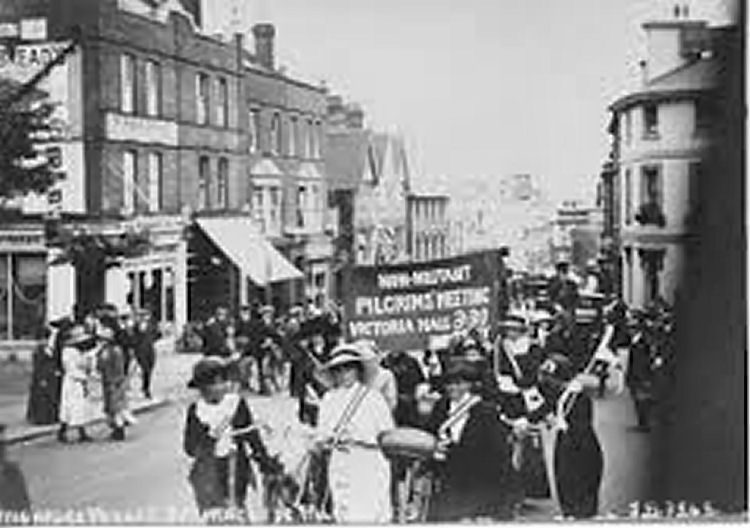
Above photo 1913, kindly submitted by Edward Gilbert. |
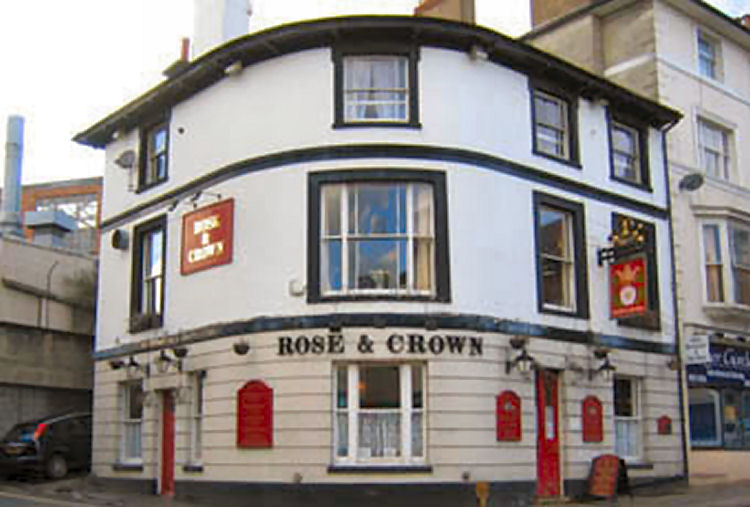
Above photo date unknown, kindly submitted by Edward Gilbert. |
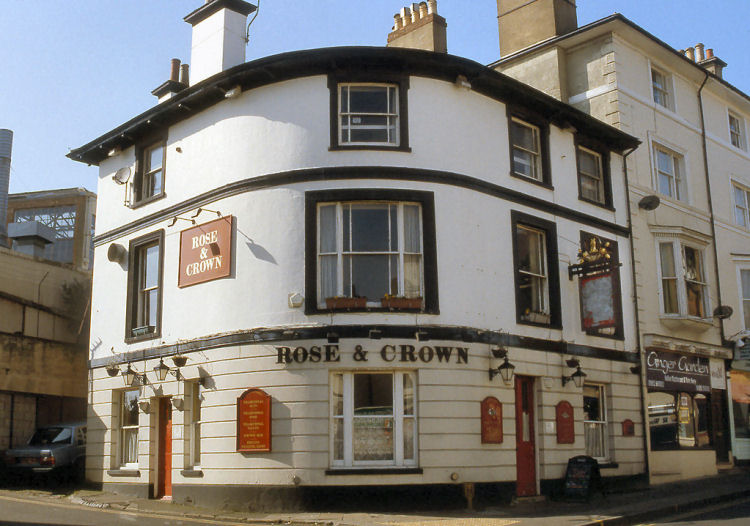
Photos taken in 1993 from
http://www.flickr.com
by John Law. |
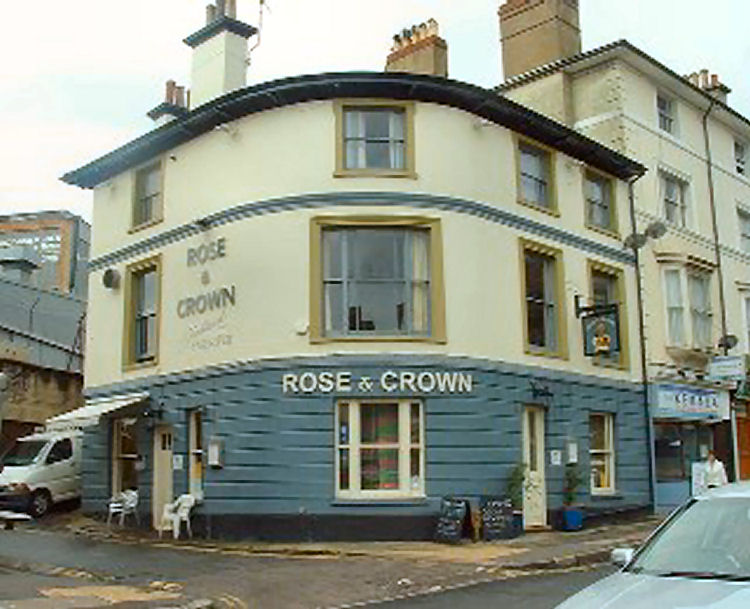
Above photo 2008. kindly submitted by Edward Gilbert. |
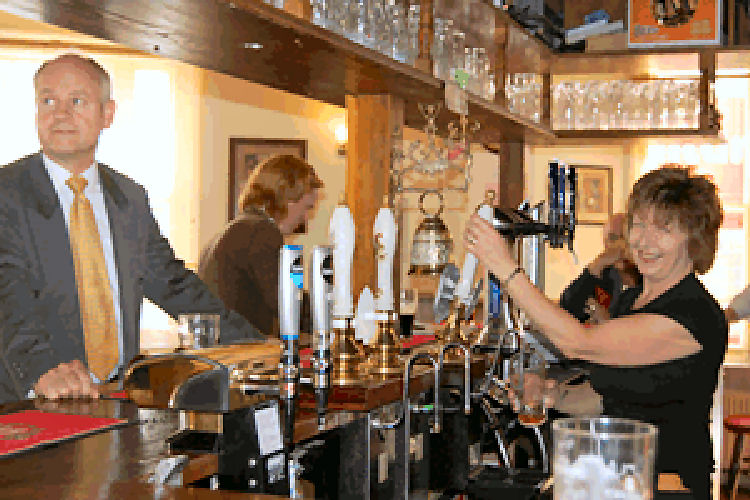
Above photo showing the inside of the pub, date unknown, kindly submitted by Edward Gilbert. |
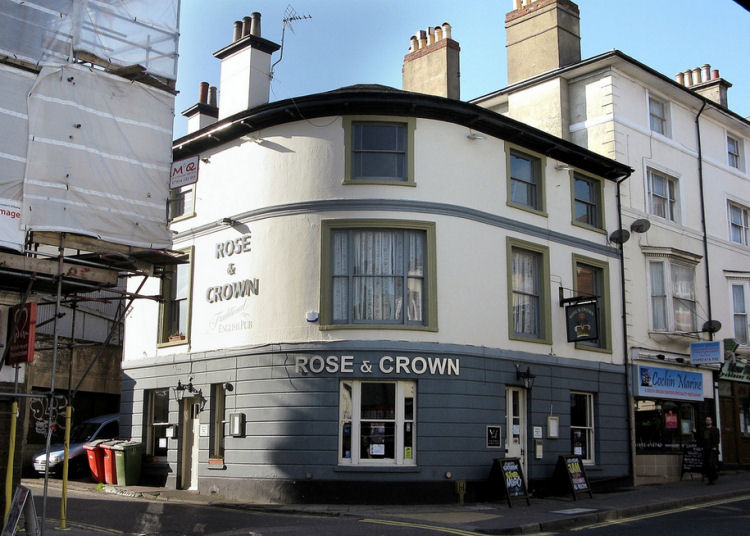
Photo taken 22 October 2011 from
http://www.flickr.com
by The Quaffer. |
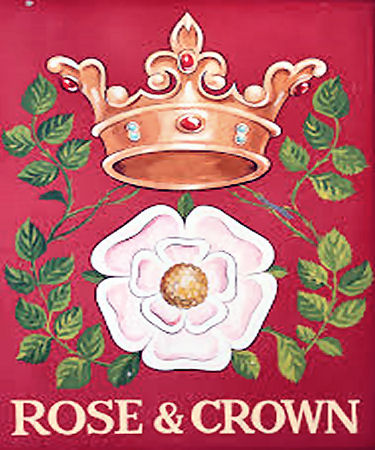
Above sign date unknown. |
I am informed by Ian Richardson that the pub was once called simply the
"Crown," and is not to be confused for the "Crown
Tavern."
Ian goes on to say the following:- "Looking at Bowra's famous map of 1738
confirmed it. The "Rose and Crown" still exists, in nearby Grosvenor Road,
in more or less the same location: it was rebuilt, and possibly slightly
repositioned, some time during the 19th or early-20th century.
The next map to name it after Bowra's (that I have to hand) is Barrow's
from 1808, by which time it is being referred to as the "Rose and Crown."
This fits in with the Poor Rate records, which first call it that in 1811.
The pub is supposed to date from c1700, according to a book by Hetherington
& Griffiths, but its first appearance in the Poor Rate records isn't until
1757, strangely, and almost twenty years after Bowra's map. The "King's
Head," which is thought to date from c1730, is listed in the Poor Rate
as well, between 1774 and 1799, but isn't named on any map or in any trade
directory.
Both fair better than the "Crown
Tavern," though. With the possible exception of a numbered reference in
an early-Victorian tithe map, it doesn't appear to be named on any map. It
doesn't seem to appear in the Poor Rate, either, until at least 1865, and
only then as "Varney Lane", not the "Crown." Trade directories also seem to
pass it by until the mid 1860s, but it is mentioned under its proprietor's
name this time, and still not the "Crown." Hetherington & Griffiths date it
to c1850, but the tithe map hints that it was there at least a decade
earlier, if not before.
The district that Varney Street fell within was called Crown Field, and I
am trying to establish whether it was named after the tavern or the tavern
was named after the district. The Crown Field streets are first shown on a
map dating from 1828, long before the "Crown" is first mentioned, and how
long they had been there by then is open to question. It seems reasonable to
assume that a pub existed there from early on, though, and perhaps it was
the "Crown." The origin of the "Crown" name is uncertain in this context,
but the fact that there was a Grosvenor estate bordering Crown Field to the
north hints at a royal connection. We'll see...
|
From the Kentish Gazette or Canterbury Chronicle,
Wednesday, 21 September to Saturday, 24 September, 1768. Price 2d.
TO BE LET
And entered upon immediately or at Michaelmas next.
A Well-accustomed Saddler's Shop at Tunbridge, situated between the
“Crown” and the “King's Head; the Owner leaving off trade, the Stock to
be sold as a fair Appraisement. It has been a Saddler's Shop for Forty
Years. For Further Particulars enquire of Mr. Samuel Mills, Tonbridge.
The "Crown"
mentioned above, later became the "Rose
and Crown" of today. Paul Skelton.
|
|
Kentish Gazette 23 October 1770.
Joseph Drywood, from Cranbrooke, Worsted and Yarn Maker, in
Mill-Lane, Maidstone. Advertising his products, also continues that he
delivers the Kentish Gazette every Tuesday & Saturday, setting out from
his house or the "Bull."
While delivering the papers he calls at the following named
Public-Houses, to collect parcels & orders.
The "Rose And Crown" at Tunbridge, as also at the Wells, ......
|
|
Kentish Gazette, 6 August 1850.
Assault and Robbery.
John Davey, 20, assaulting and robbing James Ford of half a
sovereign, 3 shillings, and other monies, at Tunbridge.
Mr. Wells prosecuted, and Mr. Addison defended the prisoner.
The prosecutor on May 10th April received his pension, amounting to
£5 5s. 6d, at Tunbridge Wells, and went into the "Rose and Crown"
public house, where he saw the prisoner and a man named Lampard,
whom he treated with some beer and rum. On leaving the house he was
very tipsy, and did not recollect what took place afterwards. In
cross-examination, he admitted having been at several other public
houses on the day.
Edward Wall deposed that he kept the "Brewers Arms," and on 10th
April he saw the prosecutor and prisoners standing in front of his
house, about 3 o'clock, and soon after prisoner knocked down the
prosecutor, and as he was getting up prisoner put his hand into the
pocket of the prosecutor, when a fight took place, and prisoner went
away.
Witness went out to him, when he said that he had been robbed, and
took from his pockets a sovereign and two counterfeit pieces,
resembling half sovereigns, and said that was all he had left out of
£1 13s. Witness then sent for the police.
Mr. Addison address the jury, and called John Till, a plumber, who
stated that he saw the prosecutor following the prisoner and another
man, and strike the former two or three times, who desired him to
desist, and threatened to strike again, when a fight ensued. He did
not anytime see the hand of the prisoner in the pocket of
prosecutor; if it had been, he must have seen it, as he watched the
proceedings very minutely. Acquitted.
|
|
Kentish Gazette, 2 December 1851.
Tunbridge Wells. Melancholy Death.
Considerable sensation was created in this place on the morning of
Sunday week, by the death of a woman apparently about 50 years of
age, who died during the previous night, under somewhat distressing
circumstances.
The following are the particulars which we have been
enabled to collect respecting the affair.
It appears that the woman,
whose name is Beale, had, on Saturday morning, about 7 o’clock,
called on her daughter, who is living as servant with Mr. J. Bailey,
of the "Rose and Crown Inn," Mount Ephraim, from whence she
proceeded to the Wells, where she accompanied a man named Henry
Wise, to a beer-house, called the "New Castle," where they had some
beer, and the woman appeared very merry, after which they repaired
to the "Kentish Yeoman" public-house about half-past ten o'clock,
where they had a pot of beer and a biscuit, which the woman
commenced eating. A portion of the biscuit appeared to take the
wrong passage, causing her to cough, vomit, and turn black in the
face, after which she slid from the seat to the floor, and was
thought by those present to be asleep.
Shortly before 12 o’clock the
landlord, Mr. Baker, sent for police-sergeant Swift, who, on the man
Wise’s refusing to see the woman home, had a very small hand-cart
procured, in which she was conveyed to the station-house. Mr. R.
Duncan, surgeon, was sent for immediately, and on his arrival, he
pronounced her dead.
|
|
Southeastern Gazette, 20 September 1853.
TUNBRIDGE. Annual Licensing Meeting.
On Wednesday last the annual meeting for renewing the victuallers’
licences for the several parishes in this division was held at the
Town-hall, before James Deane, Esq., chairman, A. Pott, Esq., Col.
Armytage, and S. Cartwright. Esq. No objection was made to the
renewal of any licence, 52 of which were renewed.
The following applications were made for new licences:— Joseph
Bailey, for the "Rose and Crown," Tunbridge Wells (a newly-erected
house). Mr. Cripps for applicant, Mr. Gorham against.
Licence granted in substitution of the present house of the same
name.
Three other applications were also refused.
|
|
From The South Eastern Gazette, Tuesday, 21 September, 1858.
Southborough Accident.
On Wednesday afternoon last, Mr. and Mrs. T. Thompson, of
Tunbridge Wells, were travelling in a pair-horse fly, the property of
Mr. Parker, of the "Rose and Crown," Tunbridge, from that town, and had
reached Southborough, when the splinter bar of the carriage struck the
legs of the horses, and they started off. The driver, seeing several
waggons and other vehicles in the road, attempted to turn the horses
down Pennington-lane, to get out of the way, but the fly was turned
over, and the driver thrown completely over the hedge into an orchard;
he was, however, but little hurt, with the exception of a few scratches
and a shaking. Mrs. Thompson was cut about the face by the pieces of
broken glass from the carriage windows, but Mr. Thompson escaped
uninjured. A leg of one of the horses was broken, and it was afterwards shot; and the vehicle was also considerably damaged. |
|
Maidstone Telegraph, Rochester and Chatham Gazette, Saturday 18th August 1860.
Insolvent debtors Court.
William Parker, of Tunbridge, Kent, assistant to Mrs. Sarah Parker,
"Rose and Crown Hotel," Tunbridge, Kent.
Discharged on bail until 19th September.
|
|
South Eastern Gazette, 25 September, 1860.
MAIDSTONE INSOLVENT COURT.
WEDNESDAY. (Before J. 'Espinasse, Esq., Judge.)
William Parker, late of the "Rose and Crown Hotel," and of the
"Angel Inn," Tonbridge, also appeared for hearing, supported by Mr.
Morgan. Mr. Bowell, a solicitor, of London, the detaining creditor,
opposed the insolvent's discharge, the grounds of opposition being
concealment of property, and absence of books and accounts. In the
course of some questions put by Mr. Bowell, it transpired that,
alter the death of the insolvent’s father, in 1861, be continued to
manage the business at the "Rose and Crown Hotel," with his mother,
the late Mrs. Harriet Parker, until 1855. It was objected that this
was not sufficiently set forth in the schedule, and the case was
adjourned for amendment of the description. Mr. Bowell also objected
that the insolvent had been liberated on bail, on a schedule showing
debts to the amount of £1,576 only, whereas these had now been
increases to upwards of £10,000. His Honour, however, enlarged the
insolvent's bail till the next court.
|
|
South Eastern Gazette, 21 August, 1860.
Maidstone Insolvent Court.
This court was held on Tuesday last, before J. ’Espinasse, Esq.,
Judge, but the business was of a very light nature, not occupying
more than half an hour.
Obadiah White, of the "Ship Inn," Queenborough, victualler, and
Robert Everitt, of "Charlton Ferry-house," Charlton, retailer of
beer, and carpenter and millwright, were discharged unopposed; and
the following were admitted to bail till next court:— William
Parker, of Tunbridge, assistant to Mrs. Sarah Parker, "Rose and
Crown Hotel;" Kennett Hall, of 77, Snargate-street, Dover,
watchmaker; and John Marsden, of No. 6, Esther-place,
Bridge-street, Greenwich, clerk to Messrs. Lovibond and Son,
brewers. Mr. C. Morgan supported the whole of the above insolvents.
|
|
From the Kentish Gazette, 21 February 1865.
Stealing Tobacco.
A fly driver, named Edward Monckton, was on Wednesday brought
before the Hon. F. G. Molvneux and W. F. Browell, Esq., charged with
stealing, on the 13th inst., from the "Rose and Crown" public-house,
four screws of tobacco, value 4d., the property of Henry Fentum, the
landlord. The prisoner had been seen to come in the house, lean over
the bar counter, and open the drawer containing the tobacco
(probably supposing it was the money till), and take something out.
He then ran off, but information having been given to the police,
P.C. Hickmott pursued the prisoner and saw him throw something away.
This was found to be the four screws, which were identified by Mr.
Fentum as his property.
The defendant was sentenced to six weeks’ hard labour.
|
|
From the Maidstone Telegraph, 1 January 1870.
Price 1d.
FATAL ACCIDENT AT THE RAILWAY STATION.
INQUEST ON THE BODY.
On Tuesday last, an inquest took place at the "Rose and Crown" Inn,
Tunbridge Wells, before J. N. Dudlow, Esq., county coroner, and a
respectable jury, of whom Mr Grant was chosen foreman, touching the
death of William Saunders, aged 54. papermaker, native of Maidstone, who
died on Saturday morning, from injuries received at Tunbridge Railway
Station, the previous evening.
The Coroner stated that it would be the duty of the jury to inquire
if the deceased met with the accident from his own negligence, or
through the fault of the railway company, and he believed, after hearing
the evidence, the jury would be satisfied that the man got out of the
train while it was in motion.
The first witness called was Edward Pemble, who deposed:— I am
son-in-law of the deceased, and reside at 17, Wyatt-street, Maidstone,
and a tailor. I have seen the deceased, where be now lies at the
Infirmary. He was a papermaker, and is 54 years of age. Last Friday
evening he was coming to spend the Christmas at Maidstone, as his family
lives with me. I did not see him alive after the accident. He was a
steady sober man.
Thomas Nicol, draper, Tunbridge Wells, stated:— On Friday evening
last, I left the Wells for London, in a special train. I was in the end
compartment of a carriage, furthest from the engine. The deceased was in
the same compartment, sitting opposite to me, and appearing to be
perfectly sober. Before coming to Tunbridge they slackened speed, and
deceased got out of the train, just as it was slightly moving, but not
sufficiently stopped to warrant any one opening the door. A young man,
nearest the door, unfastened it, and jumped out. He left the door about
one third of the way open, when deceased attempted to get out. The train
was still in motion, but the carriages did not jerk forward, but
appeared to heave forward, as though not propelled by anything behind or
in front. Deceased made a bound out, and I believe the door struck him,
and threw him under the carriage, before he reached the platform. I did
not see him fall underneath the carriage, but observed that he did not
reach the platform. I am confident no porter touched the door, and did
not hear any one call out “Tunbridge.” When I got out I found deceased
was under the third carriage back, and heard him groan out, “Oh, get me
out.” I believe the wheels had passed over him, and injured him very
much. I believe it was entirely his own fault in getting out when the
train was in motion. No prudent person would have attempted to do what
he did. The young man who opened the door and jumped out is a perfect
stranger to me, and I should not known him again. The railway officials
did all they could, and got deceased up as soon as possible.
Walter Winooomb said:— I am a porter, in the employ of the South
Eastern Railway Company, at Tunbridge. I was on duty last Friday
evening, and remember the 7.16 special train coming in from Tunbridge
Wells. It arrived about half past seven, and came in at its usual pace,
about four or five miles an hour. I was on the up-platform attending to
the train, and saw a man put his hand out and open a door of a carriage,
in front of the break. I called out three or four times “ Keep the doors
shut till the train stops.” Notwithstanding that, one man jumped out of
the carriage while the train was in motion, and soon after, I saw
deceased jump out of the same compartment and fall. I believe the door
touched him when he was on the edge of the platform. He fell between the
carriage and the break, being knocked down by the door. The wheels of
the break only passed over him. Up to that time no porter had opened the
door of the train, and I believe “Tunbridge” was not called out, but the
passengers were told to keep their seats. I don't generally call out
“Tunbridge” till the train comes to a standstill. I helped gat the
deceased up, and sent for a doctor. One leg and one arm was smashed. I
saw no bruises about the body. The doctor came and attended to him, and
he was removed to the “Angel
Inn.” I saw no more of him, and do not know the person who first
jumped out of the train.
The Coroner remarked that if people got out of the train before it
stopped, they should be reported to the station-master, and he
recommended that all such should be summoned, being the best mesas of
saving life. If he could find the name of the man who first jumped out
he would make an example of him.
Mr Grimsteed, the station-master, said a great number of passengers
disobeyed in this respect, and he should be glad to find out the
parties.
Sergt. Okill produced the clothes and property found upon deceased.
Charles Agate, another porter, deposed:—The train came in at its
usual speed. When the first person got out, the train was travelling at
about a mile an hour. I saw deceased try to get out, and believe the
door struck him, causing him to fall between the third-class carriages
and the break. Up to that time no porter bad opened any carriage, and I
heard no one call cut Tunbridge. I told the passengers to wait till the
train stopped. The accident was entirely deceased's own fault. He was
taken to the “Angel,”
and was very much injured.
Joseph Grimsteed stated:— I am station master at Tunbridge. I was on
the down platform on the evening in question, and did not see the
accident. I was told of it and immediately crossed over, and found
deceased lying under the wheels, the carriage having been uncoupled in
the meantime. It is the usual regulation not to open the carriage doors
till the train stops. The porters call out the name of the station as
the train enters, but no passenger has a right to get out till the train
I stops. Deceased was removed to the waiting-room, where Dr Bishop
attended to him, and he was afterwards removed to the “Angel.”
The surgeon thought deceased could undergo amputation, therefore he was
taken to the Tunbridge Wells infirmary. Drs Bishop and Smith with myself
accompanied him. He did not speak nor groan at all on the journey. He
had previously given the name and address of his daughter.
Blackall Marsack. Esq., Surgeon to the Infirmary at Tunbridge Wells,
deposed:— Deceased was brought here from Tunbridge, on Friday evening
last. I met him at the railway station in charge of two medical men, and
we accompanied him to the infirmary. When I got him there I found that
his left arm and left thigh had sustained compound fractures, and
apparently he was suffering from some internal injuries, but to what
extent I could not say. He was then in a state of collapse. There had
been scarcely any bleeding since the time of the accident, and every
care seemed to have been shown to him. Deceased was in such a state that
it was not thought proper to attempt amputation. I remained with him
about an hour, but he did not rally, and gradually sank, and died about
six o'clock, the next morning, from the effects of the injuries he had
received. He had been an inmate of the infirmary, suffering from a
severe burn of the left hand.
The Coroner briefly summed up, stating that there was not the least
doubt the unfortunate man left the train while it was in motion, thereby
doing what he ought not to have done. He hoped it would be a warning to
others, and begged the station master and officials to put a stop to the
dangerous practice, by summoning all those that broke the law.
The jury returned a verdict of “Accidental Death.” and expressed
their opinion that there was not the least blame to be attached to the
railway authorities.
|
|
From the Kent and Sussex Courier, Friday 16 January 1874.
Thomas Rosser V. William Waghorn. Claim £5.
Mr. Warner supported the plaintiff, a coachbuilder, who sought to
recover from the defendant, a fly proprietor, represented by Mr. Burton, the sum of £5,
for an assault committed upon the plaintiff on 24th December last.
The plaintiff received notice to quit the defendant service, and a day
also afterwards on
going into the workshop, access to which was obtained by going down some
steps, he
found a piece of round iron on the steps, which he considered had been
placed there for
the purpose of throwing him down. He saw Roser at the "Rose and Crown,"
and there he
accused him of setting a trap for him to break his neck, and when in the
yard he struck
him on the eye and kicked him.
A servant girl From the "Rose and Crown" said Waghorn came in on the
afternoon of the
24th and called Roser outside in the yard, and when he got him in the
yard he stripped
and hit him several times.
A man name Lashmere, a Smith, was also called, but he did not seem to
know much
about the case.
Defendant said he went to the "Rose and Crown" on the day in question,
and as it was
twenty minutes past three he told plaintive he should summons him for
neglect of duty,
when Roser said he didn't care for him or anybody else, and offered to
strike him.
Defendant desired him to go out into the yard, and when they got there
they fought, and
because he got the best of Roser, he (Roser) had summoned him.
Mr. Worsley, veterinary surgeon, said he was present, and he saw both
parties go out to
fight. He separated them, and he did so a second time. The man Lashmere
incited Roser
fight, and abused witness until he told him he should have a constable.
His Honour at once gave a verdict for the defendant, with costs.
|
|
From the Kent and Sussex Courier, 7 August 1874.
Tunbridge Wells Petty Sessions. Extension of Time.
Mr. G. Butcher, of the "Rose and Crown," applied for and was allowed an
extra hour on the occasion of an annual supper to be holden at his house
on the night of the 14th. |
|
Kent & Sussex Courier, Friday 14 September 1877.
An extension granted.
Mr. G. Butcher, proprietor of the "Rose and Crown," Grosvenor Road,
applied for leave to keep open his licensed premises one hour behind the
usual time, on the occasion of the annual dinner of the Delegates of the
Amalgamated Friendly Societies Fete Committee being held at his house.
The Bench granted the application.
|
|
Kent & Sussex Courier, Friday 7 March 1975.
Farewell to "Horse" pub's landlord.
Mr. Norman Pearson the former publican in Tunbridge Wells, called
last orders on Tuesday night when he retired after 19 years from the
"Rose and Crown," Grosvenor Hill.
The two bars were jammed with regulars saying goodbye to the
Yorkshire landlords and his wife Jay. Mrs. Maris Seeds presented
them with a tea set and trolley.
Mr. Pearson has no plans for his retirement, except that he will
be taking a 4 month holiday so that he can rewind from a busy life
of a landlord.
Into a flat.
As Mr. and Mrs. Pearson "only came to this part of the country by
accident" they might go back to Harrowgate, but for the time being
they will be settling into a flat in the town.
Mr. Pearson is probably best known in the town for his part in
the launching of the Tunbridge Wells racehorse 10 years ago.
Nearly every customer of the "Rose and Crown" took shares in the
horse - and Mr. Pearson recalls that £1,000 was contributed in only
10 days.
It is recognised that without Mr. Pearson's efforts the scheme
would never have got off the start line. The horse was put into the
trust training of local businessman and ran for 2 years with
considerable success before the national Hunt stewards ruled that
towns could not get a horse.
Mrs. Bridget Raynes, barmaid and cleaner, who has been with Mr.
and Mrs. Pearson for all their 19 years at the "Rose and Crown,"
decided if they had to leave so had she.
Short and Irish, Mrs Raynes was a popular character in the pub
and the regulars showed there appreciation of her work by presenting
her for the £10 shopping voucher.
When Mr. Pearson was granted the transfer of a licence at
Tunbridge Wells Court the Chairman told him "We are sorry to see you
go. You have been there a long time without a blot on your
copybook."
The new landlord who took the reins on Wednesday morning is Mr.
Ted Price from Carshalton.
|
Local knowledge, further pictures, and licensee information
would be appreciated.
I will be adding the historical information when I find or are sent it,
but this project is a very big one, and I do not know when or where the
information will come from.
All emails are answered.
LICENSEE LIST
SHARP William 1828+

SHARP Mary 1832-41+ (age 58 in 1841 ) )

BAILEY Joseph 1851-55+ (age 36 in 1851 ) )
PARKER William 1858+
PARKER Sarah 1860+
COOKE Charles 1862+
FENTUM Henry 1865+
BUTCHER George 1873-81+ (age 51 in 1881 ) )

BUTCHER Peter 1891+ (age 43 in 1891 ) )
BURREN William Edwin 1913+
HARBRIDGE John 1918-22+
HARTBRIDGE John 1930+
JONES A L 1938+
PEARSON Norman 1956-Mar/75
PRICE Ted Mar/1975+
https://pubwiki.co.uk/RoseCrown.shtml
 From the Pigot's Directory 1828-29 From the Pigot's Directory 1828-29
 From the Pigot's Directory 1832-33-34 From the Pigot's Directory 1832-33-34
 Kent
and Sussex Courier Kent
and Sussex Courier
 Census Census
|






